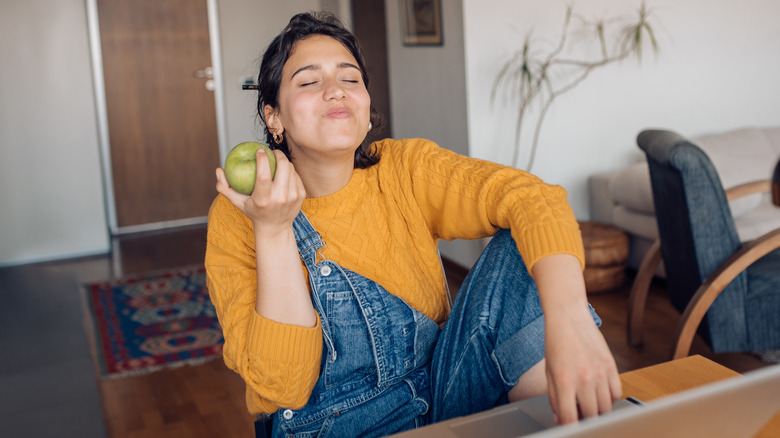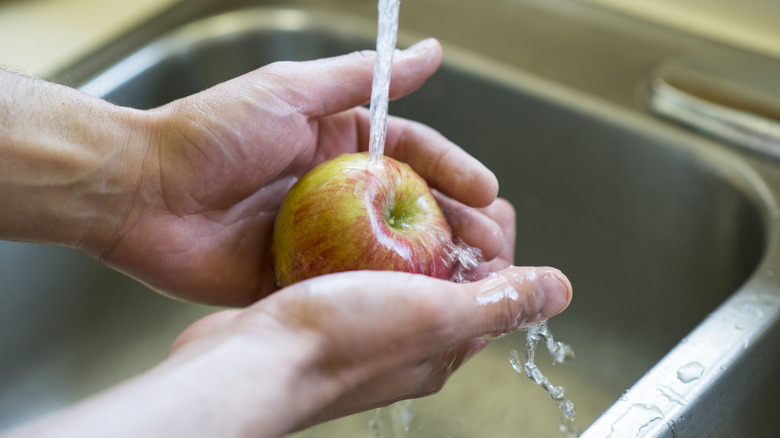Is The Waxy Coating On Apples Safe To Eat?
We may receive a commission on purchases made from links.
Eat an apple every day — it's doctor-recommended (at least, according to your mom). Apples are great for your health mainly because of two nutrients, a flavonoid called "quercetin" and a soluble fiber called "pectin." Quercetin has antioxidant and anti-inflammatory properties, while pectin keeps you from having constipation, and is also thought to be modestly beneficial in lowering low-density lipoprotein (LDL), or bad cholesterol.
Buying apples to consume, however, can make you raise a suspicious eyebrow, and no we're not referring to the ever-increasing cost of living. Ever wondered why the apples you bring home from the store look so unrealistically shiny and appealing? Surely, they didn't come from the tree looking like that. Or did they? Turns out they did, except the wax you see is not the one they first had on. Apples contain a natural waxy substance on their outer coating that prevents moisture loss and keeps fungi out. The substance is made up of 50 different compounds, some of which, interestingly, can be isolated from petroleum, per McGill University.
If you've been on TikTok in the last decade, perhaps you're more than a little disturbed after seeing posts claiming that apples are sprayed with paraffin wax that isn't safe to eat because the wax can cause cancer. Food-grade paraffin wax is considered edible and coats not just apples but other fruits and vegetables too. Let's take a closer look at what's covering those shiny red and green apples.
The waxy substance on apples explained
According to registered performance nutritionist and author of "The Gut Health Diet Plan: Recipes to Restore Digestive Health and Boost Wellbeing," Christine Bailey (via Express), apples go through a process of cleansing after they are harvested to remove dirt and debris, which also rids them of their natural protective layer of wax.
"So the apple packers typically re-apply a commercial grade wax, and one pound of that wax can cover as many as 160,000 pieces of fruit — so in other words, two drops of it on each apple. This is very little when one considers all the other additives we consume on a daily basis," shared the expert. The waxy substance that's applied is very thin — about 3 milligrams thick. More importantly, no, it won't cause cancer.
And what is this wax made of? The substances can vary but what you'd typically find include substances like carnauba wax derived from leaves of the Brazilian palm, shellac from the Indian lac bug, synthetic esters made using sucrose and fatty acids, and beeswax, to name a few. "These are natural waxes and approved for use so are considered safe to eat," added Bailey. The U.S. Food and Drug Administration (FDA) has a safe coating policy guide. Carnauba, candelilla, and beeswax are permitted for use on the UN's list of additives. Honk Kong's Center for Food Safety has noted that natural waxes that come from insects and plants are generally safe for consumption. So all those TikTokers claiming that too-good-to-be-true shiny store apples aren't safe foods to eat may need to do more research.
Do you need to wash your apples before eating them?
There's nothing wrong with the general principle of washing your fruits and vegetables before consuming them, especially since apples (covered by wax or not) can carry dirty and debris on their outer layer. Not to mention the countless number of hands the fruits may have passed through before landing where they did at the supermarket. But you probably don't need to blanch the apples in hot water or scrub them down with a knife to remove the wax, since the coating itself is considered safe for consumption.
Yes, there are videos on TikTok with people claiming you have to submerge the apples in really hot water for a few seconds or soak them in a solution of salt and baking soda before scrubbing them with a brush, and then eating them. If you are still concerned about consuming natural food-grade waxes, go ahead and try some of the hacks. Or better yet, get your apples directly from the tree, so to speak. Famers' markets might be a good place for them.
But going back to your mother's advice, is eating an apple a day actually good for you? Click through and find out.



